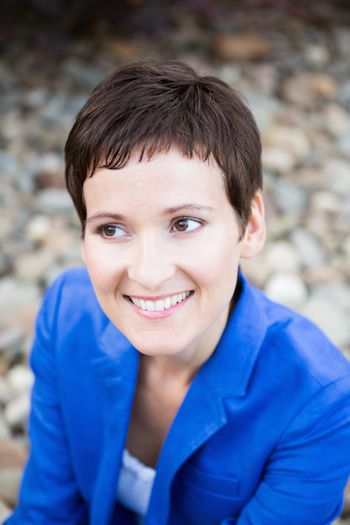The Yoga/Tao of Women-Centered Language
This post was written by H&W instructor Ginger Garner, MPT, ATC, PYT. Ginger will be instructing the course that she wrote on "Yoga as Medicine for Pregnancy" in New York this November.

The power of language is inarguable. The spoken word affects how we see, perceive, and interpret the world around us. Language can also influence our actions and behavior, especially toward people around us.
The power of language in health care is not only important, but critical in prenatal health. The language a provider uses can help or harm a mother’s confidence and even her beliefs about birth.
Action to recognize and respond to the importance of language in general health care began with People First Language (PFL) movement. PFL advocates for mindful use of language that identifies the person first, rather than identifying the person based on their disability. Advocacy groups first started the movement for children’s sake. Mother’s who had given birth to children with Down’s syndrome wanted their children to be recognized as people first, rather than by their disability.
An example of People First Language would be, “Beth is a child who has Down’s syndrome,” instead of “Beth is a Down’s (syndrome) child.”
The second statement can be dehumanizing, whether intentional or subconscious. The effects of being identified as a disability, rather than as a human being, are far reaching on psycho-emotional and physical health, and can project a negative connotation on the individual. Read more on People First Language
However, have you noticed that no such language is used for prenatal care?
The shameful statistics on American childbirth and mortality rates for mothers and babies is no secret, internationally. However, many US mothers may not realize that their likelihood of receiving poor prenatal care is so high. In fact, it is dangerously high. Read my post: American Childbirth: A Human Rights Failure?
However everyone, including health care providers who provide prenatal care, can have a powerful impact on improving childbirth in America.
How? Through language.
Yoga as Medicine for Childbirth & Postpartum courses I teach for Herman & Wallace Pelvic Rehabilitation Institute, language is a powerful part of the empowerment process for women. It is an integral part of the biopsychosocial model available to 21st century healthcare providers who use yoga in prenatal and postpartum care. Yoga can improve postpartum physical therapy care and help moms who want to have a natural childbirth. Yoga is also a powerful prenatal mind-body fitness aid as well and works to decrease pain across the journey of pregnancy and into postpartum. Read this post on Why Every Expectant Mom Needs Yoga.
Yoga is a mind-body practice that places paramount importance on language. In fact, yoga uses an entirely different language than biomedical prenatal or postpartum care. Yoga focuses on empowerment through language and action.
Prenatal care using women-centered language looks very different than the historically patriarchal driven vernacular that is still being used today. These statements describe the same situation, but have profoundly different effects on a woman and her confidence and ability to give birth. Consider these common scenarios from a perspective on The Power of Birth Language.
Which scenario would you rather give birth in:
“My doctor/midwife is going to let me use a birthing tub.”
VERSUS “My doctor/midwife supports my plan to give birth in water.”
“My doctor/midwife delivered my baby.”
VERSUS “I gave birth to my baby (in the are of ______).
The first scenario in each example takes power from the mother and negates her participation and involvement in pregnancy and birth. The first scenarios also place her in a dominator relationship under the authority and order of the health care provider.
The second scenario in each example recognizes that mothers should be full partners in their own healthcare, not subordinates without a voice. The second scenario also recognizes that birth should be women-centered, not healthcare provider-centric.
Woman-centered language can usher in a powerful shift in prenatal care, helping tip the scales toward the positive for birth reform in America. Adopting the mindfulness of an ancient system, like yoga, can likewise enrich and expedite the process of reclaiming the full power of birth.
To learn more about Ginger's Women-centered continuing education for health care providers seeking integrated care when working with women during pregnancy or postpartum, visit Yoga as Medicine for Childbirth & Postpartum and join her for Yoga as Medicine for Pregnancy
By accepting you will be accessing a service provided by a third-party external to https://hermanwallace.com./







































